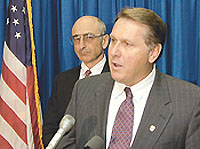Teamsters to Clean House
 |  Michael James — Transport Topics |
 | Edwin H. Stier (left) listens while Teamsters President James P. Hoffa announces an anti-corruption campaign. |
"It’s time now to help the union develop the capacity to police itself," Stier said.
General President James P. Hoffa said union is a completely different organization from the one the federal government prosecuted in 1989 for its ties to organized crime.
For this reason, Hoffa said, the time has come to end government control of Teamsters operations.
The Teamsters union is anxious to get out from under the financial burden of government oversight, which the organization estimates cost it more than $80 million over the last decade to comply with the decree.
In 1992, the union had a net worth of more than $150 million. Seven years later, the figure has dropped to $3 million.
On June 16, Hoffa sent a letter to Deputy Attorney General Eric H. Holder asking for a meeting to discussing returning autonomy to the union. Holder, in turn, suggested union officials meet with Mary Jo White, the U.S. Attorney for the Southern District of New York.
"We want to advise her of what we’ve done and we also want to dialogue with her about what she believes," Hoffa said. "What’s it going to take to rid the union of corruption and end the government supervision?"
Union officials were unable to be specific about the exact features of its anti-mobster program, but it will cover four general areas: establishing a set of ethical standards for union members and officers; educating Teamsters members about them; devising procedures for internal investigation and enforcement; and identifying any remaining organized crime influences in the union.
2244

